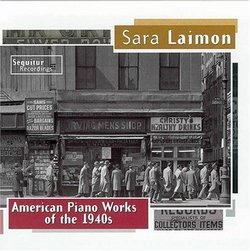A Valuable Document of American Piano Music in the 1940s
J Scott Morrison | Middlebury VT, USA | 09/02/2004
(5 out of 5 stars)
"This CD brings together some of the landmark piano works written by American composers during the tumultuous decade of the 1940s. This was a time of change in American music. On the one hand there was the 'American' sound of Aaron Copland which, on this disc, informs both Lukas Foss's 'Fantasy Rondo for Piano (1946) and the 'Seven Anniversaries' (1943) of Leonard Bernstein, and on the other hand there was the 'modernism' of Leon Kirchner's 'Piano Sonata' (1948) which partakes wholeheartedly of atonal procedures, albeit somewhat romantically. Somewhere in between was Elliott Carter's 'Piano Sonata' (1945-45, rev. 1982) which seems to have trouble pledging allegiance to either atonalism or Coplandesque neoclassicism and winds up being a winning combination of both. Off by itself is Carl Ruggles's ruggedly individualistic 'Evocations - Four Chants for Piano' (1937-1943, rev. 1954), which, like the rest of his meager output, is sui generis.
Each of these pieces has been recorded before, but never have any of these important works appeared together on one CD, and therein lies at least some of the importance of this release. One could argue that Charles Rosen's recording of the Carter sonata is definitive--it's included in his complete traversal of Carter's piano works--but I am impressed with this performance by Sara Laimon, a pianist who specializes in modern music and who founded the very fine modern music ensemble, Sequitur, whose recording of the Carter Double Concerto [Laimon playing harpsichord with Stephen Beck, piano] I reviewed favorably here at Amazon. And of course Bernstein and at least two other pianists have recorded the 'Seven Anniversaries.' What Laimon lacks in Bernstein's pizzazz she makes up for in pianistic subtlety; she brings out the aching emotion, for instance, in the 'In Memoriam: Nathalie Koussevitsky' that I don't find in Bernstein's own performance. Leon Fleisher has recorded Kirchner's 'Piano Sonata,' but I've not heard it. Indeed, I had never heard the piece before, but I am inclined to believe that its rhapsodic passacaglia first movement is a true masterpiece of both construction and emotional impact. The Adagio seems to be telling some kind of ghost story, reminiscent in some ways of Bartók's night music. The frenetic toccata-like third movement quotes the earlier movements in, again, a kind of Bartókian arch form and then, somewhat surprisingly, seems to end tonally. Laimon plays a bit cautiously here, it seems to me, and perhaps the impact of this movement is somewhat lessened, although I have nothing to compare it with. I would love to hear Fleisher's version.
I'm least impressed by 'Evocations' by Ruggles, but that is almost certainly my deficiency; I have never warmed up to his music, having never quite discovered its logic and being somewhat put off, then, but what sounds like random dissonance. I have no complaint about the skill of Ms Laimon's performance however.
By far my favorite performance here, probably because I love the piece so much, is Lukas Foss's 'Fantasy Rondo for Piano' which is the most tonal and most obviously American-sounding of any of the music here. Indeed, it reminds one as much of Bernstein as of Copland. (Perhaps we should remember that Foss was the spectacular piano soloist in the first recording of Bernstein's jazzy 'Age of Anxiety' Symphony, made in roughly the same time period as this piece of Foss's.) It is a loose set of variations underpinned by infectious motoric drive, and it is entirely winning in its cocky assuredness.
One final note: the printed insert supplied by Albany is first-class. It folds out, rather than being in booklet form, and on one side of this five-page-long insert is a gorgeous black & white photographic panorama of 'Sixth Avenue between 43rd and 44th Streets' (New York City) done in 1948 by Todd Webb, and on the other side are some illuminating notes by Yale musicology professor, Michael Friedmann. I've cavilled about Albany's sometimes careless liner notes in the past, but not this time. This insert is part of a carefully planned presentation and conveys not only information about the music but about the ambience in which most of these works were written.
Heartily recommended.
TT=73:41
Scott Morrison
"


 Track Listings (5) - Disc #1
Track Listings (5) - Disc #1